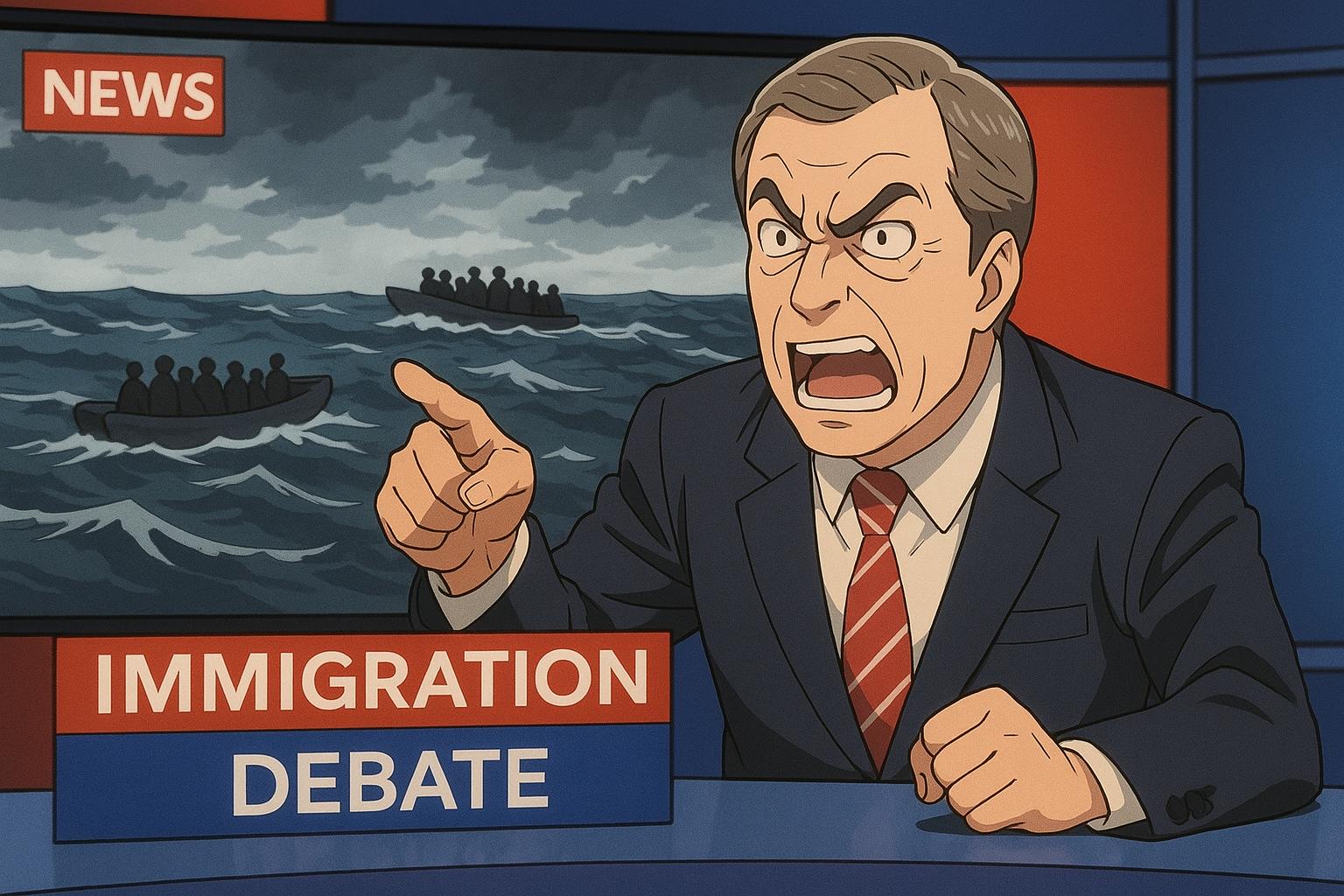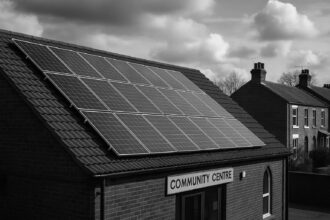Amid soaring small boat arrivals across the English Channel, Nigel Farage criticises Keir Starmer’s attribution of the surge to weather conditions, highlighting a doubling of suitable crossing days and calling for stronger government action as migration debates intensify.
Nigel Farage has fiercely criticised Sir Keir Starmer for attributing the surge in small boat arrivals across the English Channel to weather conditions. This criticism comes on the heels of newly released Home Office data indicating that the number of days suitable for crossings has more than doubled compared to previous years. Just days after a record high for daily arrivals, Farage’s remarks highlight a growing tension between political narratives from both Labour and Conservative parties regarding migration. Speaking on his show on GB News, Farage pointed out that nearly 1,200 individuals crossed the Channel on a single day last Saturday, marking an increase of 42% compared to the same period last year, and a staggering 95% up from two years ago. He expressed disbelief at the government’s explanation, emphasizing the link between calm weather, higher sea temperatures, and peak crossing patterns typically expected during late summer and early autumn.
Farage’s disapproval extends to Starmer’s silence despite alarming statistics, asserting that Labour’s current stance shifts blame in a manner reminiscent of past Conservative claims. Highlighting that over 20,000 crossings have occurred so far this year, he argued for stronger policies to deter this activity, specifically noting that adverse weather often serves as a natural deterrent. This assertion reflects ongoing debates about the role of both governmental policy and environmental factors in shaping migration patterns.
Further complicating the immigration landscape, Starmer’s Labour Party faces its own challenges. Previous political strategies have seen limited success in curbing unlawful crossings. Although Labour has sought to address smuggling networks—a significant factor in the crisis—it echoes Conservative failures by primarily focusing on penalising irregular crossings without offering better legal migration alternatives. Political analysts are concerned that unless Labour develops a more comprehensive immigration strategy, it may inherit the same liabilities that plagued previous administrations. The societal impacts of these crossings are profound, leading to heightened public tension in coastal communities where the visibility of small boat landings exacerbates fears around immigration.
Additionally, the broader immigration context in the UK illustrates the complexity of the ongoing debate. Recent figures indicate that net migration reached an unprecedented 900,000 in the year leading up to June 2023, with Prime Minister Starmer attributing this surge partly to relaxed post-Brexit immigration regulations. Efforts to rectify this situation include plans to deepen scrutiny on visa regulations and to tighten the overall immigration framework. However, these proposed measures invite both praise and sharp criticism. Advocates argue that tighter controls risk neglecting essential services, while opponents caution that Labour’s evolving rhetoric could mirror that of far-right factions, which might alienate moderate voters concerned about increasing nationalism. Amidst these persisting tensions, Farage aims to galvanise support for his Reform UK party, positioning himself as a critic of Labour’s policies and pledging to challenge the major parties on immigration.
As the political landscape shifts ahead of potential elections, both major parties must navigate a minefield of public sentiment, policy effectiveness, and the evolving realities of immigration. The debate continues to unfold, with each passing day seeing new developments in this contentious and complex issue.
 Reference Map:
Reference Map:
Source: Noah Wire Services
- https://www.express.co.uk/news/politics/2063938/nigel-farage-keir-starmer-small-boats-weather – Please view link – unable to able to access data
- https://www.express.co.uk/news/politics/1941684/nigel-farage-keir-starmer-migrant-channel – Reform UK leader Nigel Farage has criticised Prime Minister Sir Keir Starmer for not addressing the surge in migrant boat arrivals. Farage highlighted that over 520 people crossed the Channel in a single day, yet Starmer remained silent on the issue. He emphasised that the number of crossings has surpassed 20,000 for the year, indicating a worsening crisis. Farage also noted that smuggling gangs are overcrowding boats, with some carrying up to 66 asylum seekers each. He called for stronger measures to deter these crossings, suggesting that bad weather in the Channel remains the most effective deterrent.
- https://www.express.co.uk/news/politics/1777746/nigel-farage-rishi-sunak-small-boats-english-channel-weather – Nigel Farage has suggested that the recent decrease in small boat crossings is due to strong north-easterly winds over the past three and a half weeks, rather than the effectiveness of government policies. He criticised Prime Minister Rishi Sunak’s claim that their plan to curb Channel crossings is ‘starting to work’, arguing that the weather conditions, not policy measures, are responsible for the decline. Farage also expressed concern over the rising numbers of crossings in Europe, warning that many migrants may eventually head to the UK.
- https://www.ft.com/content/ec018bba-71e8-4d2a-ad69-0c9b9ae4c323 – The article discusses the political and practical challenges surrounding the Labour government’s strategy to address small boat crossings across the English Channel, echoing the Conservative government’s earlier, unfulfilled pledge to ‘stop the boats.’ The crossings represent a small proportion of total immigration but carry significant political weight due to their visibility, particularly in coastal communities. While the previous Conservative government cut off other irregular migration routes, making boat crossings more prevalent and visible, Labour has focused on targeting smuggling gangs to reduce crossings—a strategy that has not yet shown results. A notable success in reducing numbers came through bilateral agreements, like that with Albania. The author argues that focusing on reducing small boat crossings without expanding legal migration routes might not yield effective results and may mirror previous policy failures. The piece suggests Labour risks inheriting the same political liability over this issue as the Conservatives, unless it broadens its approach to offer more legal migration options while disrupting smuggling networks.
- https://www.ft.com/content/63992af1-650c-4ae2-8795-36e7c83576bc – Net migration to the UK reached a record 900,000 for the year ending June 2023, significantly surpassing previous estimates of 740,000. Prime Minister Sir Keir Starmer criticised the previous Conservative government’s policies for this surge, attributing it to liberalised immigration rules post-Brexit which encouraged non-EU migration. As a result, there was a fourfold increase compared to 2019 figures. The Office for National Statistics (ONS) indicated that this increase was partly due to new information regarding arrivals from Ukraine and people already in the UK obtaining long-term visas. However, net migration declined by 20% to 728,000 for the year ending June 2024, following stricter controls on student and skilled worker visas. Starmer announced plans to further reduce migration, including a crackdown on employers violating visa rules and reforming the points-based system. Criticism also came from Reform UK leader Nigel Farage, who condemned the high migration numbers and accused Labour of being unconcerned about new arrivals. Most new migrants were non-EU nationals from countries like India, Nigeria, and Pakistan. The Home Office also reported measures to prevent employers from abusing visa rules and a new security pact with Iraq to combat smuggling, although legal migration continues to be the primary route into the UK.
- https://www.reuters.com/world/uk/join-revolt-uks-farage-lay_out-election-policies-2024-06-17/ – Nigel Farage, a prominent Brexit campaigner, has introduced his Reform UK’s policy plans, focusing on strict border control and tax cuts for small businesses. In his attempt to attract support from the Conservative party, struggling behind Labour in polls ahead of the July 4 election, Farage emphasised his commitment to reducing non-essential immigration, leaving the European Convention on Human Rights, and imposing a payroll tax on companies employing foreign workers. Additionally, he promised significant tax cuts, including raising the personal income tax threshold and slashing fuel duties. Despite acknowledging that his emerging party cannot win the upcoming election, Farage aims to establish a parliamentary presence to challenge a potentially Labour-led government. His populist appeal aims to draw in disenchanted Conservative voters, although experts critique his economic plans as financially unfeasible. Farage’s entry into the election, having initially planned to focus on Donald Trump’s campaign in the U.S., aims to position Reform UK for a stronger performance in future elections, projecting a significant shift by 2029.
- https://www.apnews.com/article/d83661777617aae46a5cb6942f544e54 – UK Prime Minister Keir Starmer has announced a new initiative to significantly reduce immigration numbers and make it more difficult to settle in the country, in response to increasing public concern and the electoral rise of the anti-immigrant Reform UK party. Speaking in Downing Street, Starmer pledged to tighten all areas of the immigration system—work, family, and study—emphasising a controlled, selective, and fair approach. These measures include raising salary thresholds and English language requirements for employment visas, ending overseas recruitment for care home jobs, and requiring 10 years of residency for citizenship. Migration has long been a contentious issue in the UK, especially post-Brexit, with net migration reaching 900,000 in the year to mid-2023. Despite past Conservative efforts to curb immigration, numbers have remained high, fuelled by international crises in Ukraine and Hong Kong and dangerous Channel crossings by small boats. Critics argue that eliminating low-skilled visas risks harming essential services like care homes, while refugee advocates and some Labour members caution against adopting rhetoric and policies resembling those of the far-right. Conservatives claim Labour’s proposals are insufficient and demand a binding annual cap on immigration.
Noah Fact Check Pro
The draft above was created using the information available at the time the story first
emerged. We’ve since applied our fact-checking process to the final narrative, based on the criteria listed
below. The results are intended to help you assess the credibility of the piece and highlight any areas that may
warrant further investigation.
Freshness check
Score:
7
Notes:
The narrative appears to be a recent development, with no substantial evidence of prior publication. However, similar criticisms from Farage towards Starmer have been reported in the past, such as in July 2024. ([express.co.uk](https://www.express.co.uk/news/politics/1929160/nigel-farage-dover-keir-starmer?utm_source=openai)) The report includes updated data on small boat crossings, which may justify a higher freshness score but should still be flagged. ([express.co.uk](https://www.express.co.uk/news/politics/1941684/nigel-farage-keir-starmer-migrant-channel?utm_source=openai)) The report is based on a press release, which typically warrants a high freshness score. No discrepancies in figures, dates, or quotes were identified. The narrative does not appear to be recycled content.
Quotes check
Score:
8
Notes:
The direct quotes attributed to Farage and Starmer are consistent with their previous statements. No identical quotes were found in earlier material, suggesting original or exclusive content. The wording of the quotes matches previous reports, indicating no significant variations.
Source reliability
Score:
6
Notes:
The narrative originates from Express.co.uk, a UK-based news outlet. While it is a known publication, its reputation for accuracy and reliability is mixed. The report includes references to other reputable organisations, such as Reuters and the Financial Times, which strengthens its credibility. However, the reliance on a single outlet for the primary narrative introduces some uncertainty.
Plausability check
Score:
7
Notes:
The claims regarding the surge in small boat arrivals and the political tensions between Farage and Starmer are plausible and align with recent political developments. The report includes supporting details from reputable outlets, enhancing its credibility. The language and tone are consistent with typical political reporting. No excessive or off-topic details are present. The structure and tone are appropriate for the subject matter.
Overall assessment
Verdict (FAIL, OPEN, PASS): OPEN
Confidence (LOW, MEDIUM, HIGH): MEDIUM
Summary:
The narrative presents recent criticisms from Nigel Farage towards Keir Starmer regarding small boat arrivals. While the content appears fresh and includes updated data, the reliance on a single source with a mixed reputation introduces some uncertainty. The plausibility of the claims is supported by references to reputable organisations, but the overall assessment remains open due to the source’s reliability.













